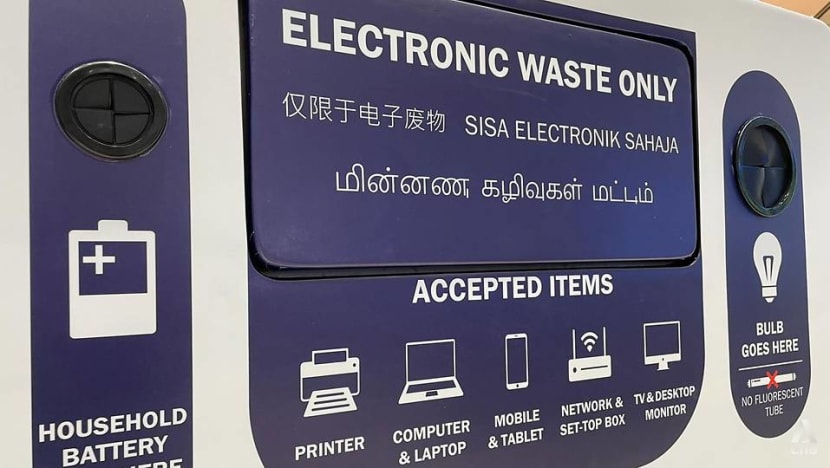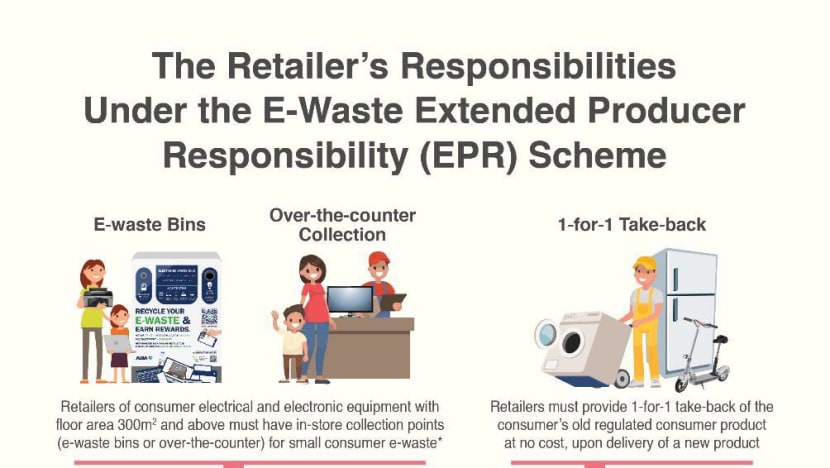Singapore's e-waste collection and disposal scheme: What you need to know

A three-in-one e-waste recycling bin at a Harvey Norman outlet, which can take in ICT equipment, light bulbs, and batteries. (Photo: CNA/Vanessa Lim)
SINGAPORE: Around 60,000 tonnes of electronic and electrical waste (e-waste) get thrown out from homes and companies each year. That is equivalent to about 70 mobile phones being discarded by each person a year in Singapore.
While there is no official data on how much of that e-waste gets recycled, these items – which can contain hazardous materials such as heavy metals - are often thrown down the chute or left at rubbish centres, creating potential health and environment risks.
READ: Nationwide e-waste management system to start in Singapore on Jul 1
To tackle the growing mountain of e-waste, Singapore will regulate the management of certain types of e-waste from Thursday (Jul 1). This will place the responsibility of managing the disposal of such items on companies that supply them to Singapore's market.
More collection points will also be set up for the public to recycle e-waste.
WHAT CAN YOU RECYCLE?
There are four main categories of regulated e-waste that the public can recycle through various collection avenues.
They include information and communications technology (ICT) equipment such as mobile phones and computers, as well as large appliances such as refrigerators and personal mobility devices.
Light bulbs and tubes, as well as batteries, can also be collected for recycling.
These items have been regulated based on their waste generation volumes as well as the potential impact on the environment, according to NEA.
WHERE CAN YOU RECYCLE THE ITEMS?
From Jul 1, more than 300 e-waste recycling bins will be installed at various locations such as town centres, shopping malls and supermarkets. Quarterly collection drives will also be conducted at residential estates, while town councils will provide bulky item disposal services for large household appliances.
READ: Singapore unveils Green Plan 2030, outlines green targets for next 10 years
The list of bin locations will be available on ALBA’s website from Jul 1, ALBA’s STEP UP Sustainability mobile app and NEA’s website.
If you are buying a new product to replace an existing item, you can request a free one-for-one take-back from your retailer upon delivery of the new item. This is regardless of where you bought the item or the brand of the product.
Retailers with a floor space of 300 sq m or more will also be required to provide in-store collection services.

WHAT HAPPENS TO THE ITEMS?
All regulated e-waste will be collected by ALBA E-waste, the National Environment Agency’s (NEA) appointed Producer Responsibility Scheme operator. The items will be sent to licensed e-waste recyclers, who will ensure that all data stored on data-containing devices are permanently erased or destroyed before the device is prepared for reuse or recycling.
ALBA will set up a data management system to track and report to NEA the amount of e-waste collected.
WHO WILL BEAR THE COSTS?
Producers who supply regulated electrical and electronic products above a prescribed supply threshold will have to join the Producer Responsibility Scheme (PRS) and finance the collection and treatment of e-waste.
Producers are companies that manufacture or import regulated electrical and electronic products.
READ: Commentary: Why does Singapore still lack a recycling ethos?
The amount they will have to pay will vary according to their percentage share of supply to the market, and the total weight of e-waste collected and sent for treatment by ALBA.
This means that the higher a producer’s market share, the higher the fees it will bear, compared to others under the scheme.
The fee structure can be viewed on NEA’s website.
WHAT ABOUT PRODUCTS SOLD ONLINE?
A producer will have to join the Producer Responsibility Scheme if they supply above the threshold, regardless of the platform they use to do so.
This applies to producers who are also retailers.
It does not apply to companies who only sell the items, but do not import or manufacture them.
WHAT ABOUT NON-REGULATED E-WASTE?
While the new system covers a wide range of electronic and electrical products, certain items such as ink cartridges are not included in NEA’s list of regulated e-waste.
Some companies, including Epson and Canon, have launched their own initiatives to collect used toner and ink cartridges for recycling.
There are also cash-for-trash programmes available for members of the public who wish to recycle their unregulated e-waste.












